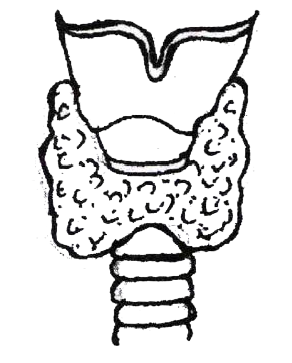Name the following:
The hormone that regulates the basal metabolic rate.
To answer the question regarding the hormone that regulates the basal metabolic rate, we can follow these steps:
1. Understanding Basal Metabolic Rate (BMR):
- The basal metabolic rate (BMR) is the amount of energy expended while at rest in a neutrally temperate environment, in the post-absorptive state (meaning that the digestive system is inactive, which requires about 12 hours of fasting in humans).
- It represents the minimum number of calories required to maintain basic physiological functions such as breathing, circulation, and cell production.
2. Identifying the Hormone:
- The hormone primarily responsible for regulating BMR is thyroxine.
- Thyroxine is produced by the thyroid gland and plays a crucial role in controlling the metabolism of the body.
3. Function of Thyroxine:
- Thyroxine increases the metabolic rate, which means that when thyroxine levels are high, the body burns more calories, leading to a faster metabolism.
- Conversely, low levels of thyroxine can lead to a slower metabolism and potentially weight gain.
4. Conclusion:
- Therefore, the hormone that regulates the basal metabolic rate is thyroxine.
Final Answer:
The hormone that regulates the basal metabolic rate is thyroxine.
---
- The basal metabolic rate (BMR) is the amount of energy expended while at rest in a neutrally temperate environment, in the post-absorptive state (meaning that the digestive system is inactive, which requires about 12 hours of fasting in humans).
- It represents the minimum number of calories required to maintain basic physiological functions such as breathing, circulation, and cell production.
- The hormone primarily responsible for regulating BMR is thyroxine.
- Thyroxine is produced by the thyroid gland and plays a crucial role in controlling the metabolism of the body.
- Thyroxine increases the metabolic rate, which means that when thyroxine levels are high, the body burns more calories, leading to a faster metabolism.
- Conversely, low levels of thyroxine can lead to a slower metabolism and potentially weight gain.
- Therefore, the hormone that regulates the basal metabolic rate is thyroxine.
The hormone that regulates the basal metabolic rate is thyroxine.
Topper's Solved these Questions
Similar Questions
Knowledge Check
- Question 1 - Select One
The hormone that regulated the calcium level of blood is
AinsulinBestrogenCparathormoneDthyroxine
Which of the following hormones regulates the immune system ?
View SolutionWhich of the following hormones regulates humoral immunity ?
View SolutionThe hormones which regulate phloem transport are
View SolutionThe hormone which regulates homeostasis of minerals is secreted by
View SolutionThe hormone which regulates the basal metabolism in our body is secreted from
View SolutionThe diagram given below represents the location and structure of an endocrine gland. Study the same and answer the questions that follow:

(i) Name the endocrine gland shown in the diagram.
(ii) Name the secretion of the gland which regulates basal metabolism
(iii) Name the mineral element required for the synthesis of the above mentioned hormone.
(iv) Name the disease caused due to undersecretion of the above mentioned hormone in children.
(v) Name the disease caused due to hypersecretion of the above mentioned hormone .View SolutionWhich of the following hormones regulates growth and metamorphosis in insects
View Solution

